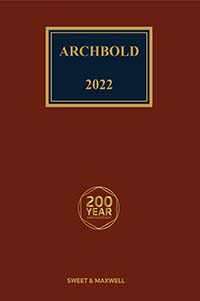Archbold: Criminal Pleading, Evidence & Practice

General Editor: His Honour Judge Mark Lucraft QC
Publisher: Sweet & Maxwell
ISBN: 9780414098459RRP: eBook–Proview £395
Blackstone’s Criminal Practice 2022

Editors: David Ormerod CBE, QC (Hon) and David Perry QC
Publisher: Oxford University Press
ISBN: 9780192849410RRP: Hardback, 3 Supplements + eBook £395
This year, LexisNexis celebrates the 200th anniversary of this magazine. By a nice coincidence Archbold also celebrates its own, very special 200th anniversary.
The new edition of Archbold includes the preface to the 1822 first edition by the then editor, John Frederick Archbold. He was born in 1785 and called to the Bar in 1814. As well as creating one of the most iconic criminal law texts, he also dabbled in design and was credited with the ‘Archbold Collar’ in 1830, a version of the high collar which apparently sloped off the ear. It was not a major success and









